 |
| WIEP Camp at Stone Mountain Powwow, GA, 2013. |
|
|
| Woodland Indian Lifeways Program |
The Camp Exhibit:Our camp is an inviting area for visitors to explore and learn. Many of our items are displayed inside or about the outside work space, hearth area, and structure. Our structure design is based on a temporary camp (ex. hunting or sugar camp) and can vary from an a-frame to lean-to depending on season and local traditions. Our structures are usually covered with natural reed mats, trade canvas, and often with bark sheets (as available). With our a-frame wigwam/lean-to, we also have a shade shelter and hearth frame. View more pictures by clicking on camp photos. Cultural Items on Display:We display over 100 cultural items and re-created artifacts* representing over 16 Native communities of the Northeast, pre-contact through the mid 1800's. Examples include: engraved shell gorget, animal effigy clay bowls, mica and shell necklaces, copper jewelry, twined skirts clothing, turkey feather mantle, woven shoulder bags, stone and clay pipes, bows and arrows, bear paw style snow shoes, muskrat tobacco pouch, wampum bag, walnut dyed and quillworked hunting bag, beaded pouches, fingerwoven bags, ribbon applique decorated clothing, British coat, European style hats and Native style hoods, corn husk shoe, centerseam moccasins, cloth and corn husk dolls, pottery and trade iron/copper kettles, stone and trade iron axes, musket and powder horns, fish hooks of bone and copper and trade iron, gill nets, hoop net, catching basket, lacrosse (ball game) sticks, shinny and doubleball sticks, hoop and pole game, children's toys, cradleboard, baby hammock, gourd containers, baskets and pouches made out of bark, wood, and natural fibers, some Native dehydrated storage foods (for a program that highlights Native foods, please click on Native Foods) and much more. To view pictures of some of these items, please click on cultural collection.
*Our items are not actually historic or artifacts. Our items are re-creations based on museum pieces and historic paintings, engravings, and descriptions.
|
 |
| Part of WIEP's cultural display. |
|
|
|
|
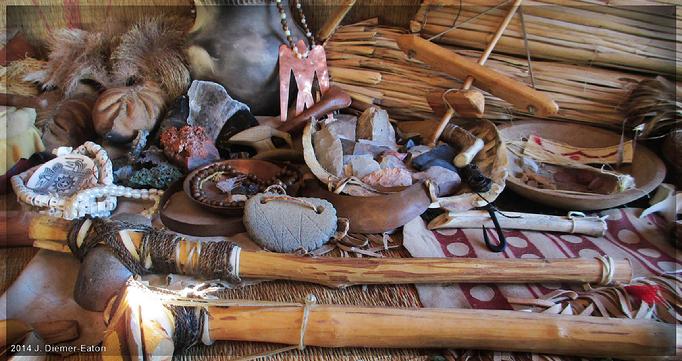 |
| Part of WIEP's cultural display. |
|
|
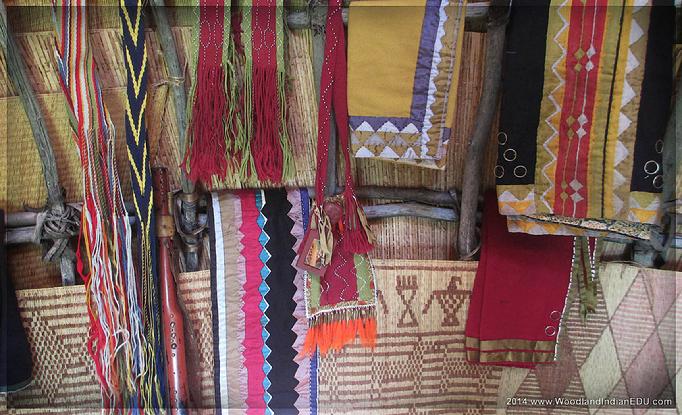 |
| Part of WIEP's cultural display. |
|
|
Ongoing Demos:We often have a live demonstration as part of the Lifeways Program, whether it be cattail mat sewing, hide cleaning, cordage making, or light cooking (for a program that showcases Native cookery and food processing, please refer to our Native Foodways program).
|
 |
| Natural fiber cordage making demo. Often visitors are invited to try. |
|
|
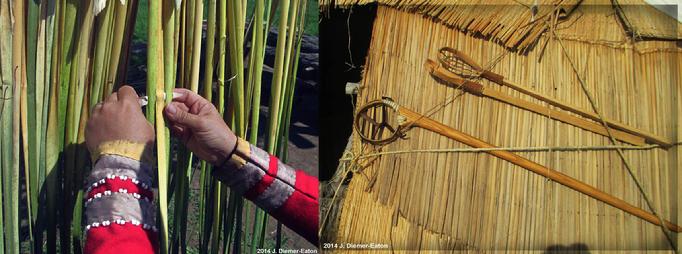 |
| Cattail mat sewing interactive demo (left), and finished cattail mat on wigwam (right). |
|
|
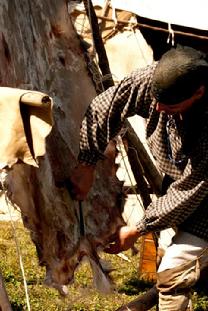 |
| Cleaning a deer hide (photo by Jen Badr). |
|
|
An Interactive Format:Friendly interpretation is the heart of our programs. Face to face conversation and encouraging questions is standard rule for us. We offer hands-on learning opportunities for visitors (especially children) such as grinding corn using a wooden mortar and pestle, sifting cornmeal with special baskets, using a pump drill, guessing animals by their furs (and learn their names in Miami), and more. Plus, when space allows, children can try their hand at corn cob darts, ring and pin games, a version of hacky-sack, playing catch using doubleball and lacrosse rackets or passing using shinny sticks, etc. Prices:Fees for a full camp set-up with on-going daily demos are $450 for day 1, and $375 for day 2, 3, and so on. Plus travel and hotel fare. There is no booking fee, however a contract or 'Booking Agreement' may be requested. We can provide this. For more info or to schedule, please contact Jessica at events@woodlandindianedu.com.
|
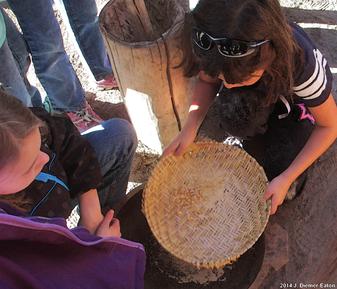 |
| Children sift cornmeal they ground in wooden mortars. |
|
|
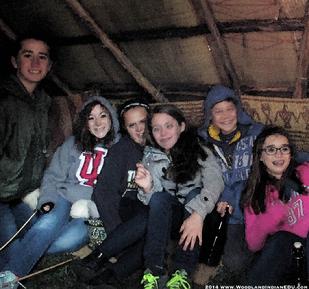 |
| Teens enjoying our a-frame lodge. |
|
|
 |
| Powwow dancer tries his hand at doubleball (Great Mohican Powwow 2010). |
|
|
|